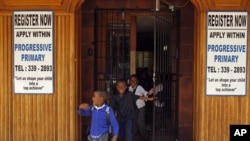Continue to Parts: 1 / 2 / 3 / 4 / 5 / 6 / 7/ 8 / 9 / 10 / 11 /12
Since 1994, after the introduction of compulsory education in South Africa, the number of children attending school has risen sharply. However, structural problems in the education system have resulted in many poorly prepared high school graduates and high numbers of dropouts in the final grades.
In December, the South Africa government hailed the 70 percent pass rate for percent high school final exams, as a major achievement. It has risen every year since 2008 when 62.5 percent of students passed.
These statistics, although reflecting an improvement in South Africa’s basic education system, mask some major shortcomings that concern many education specialists here.
Major advances
Shireen Motala, director of research and innovation in the department of Post Graduate Studies at the University of Johannesburg, tells VOA that access to basic education in South Africa is no longer the problem, and that most children stay in school until about 16. But she notes less than 50 percent of children who start school write their final high school examination, known in South Africa as "matric." That equals 600,000 students who dropped out by last year.
"In fact of the cohort who sat the [high school examination] in 2011, and those who started in 2000, only about, I think, around 45 percent survived, which means that a large number of children are falling by the wayside and the concern is that where do those learners actually go to," said Motala.
Marketable skills
With an unemployment rate in South Africa of 24 percent, dropouts have a bleak future as they must compete with high school, college and university graduates for jobs.
Researchers say that the country’s schools produce too few math and science graduates capable of pursuing those subjects at a tertiary level.
Graeme Bloch, visiting adjunct professor at the School of Public and Development Management at the University of the Witwatersrand, says this is because teachers and schools are ill equipped to adequately teach these subjects.
"The reality of poverty and resources, that children don’t see laboratories and partly, as a result their science marks, are not very good, because they don’t have libraries at school. Ninety-two percent of the schools don’t have libraries," said Bloch.
Rural areas lag behind
Education specialists say many historically disadvantaged schools in rural areas and townships are dysfunctional because the principals or the teachers, or both, are failing. They say, in some cases, the failure is because dereliction of duty and many simply do not have the skills or appropriate training for their jobs, particularly in the important subjects of math and science. Motala says there are a number of causes for these weaknesses.
"I think a number of teachers were trained during apartheid, which means the training was not up to standard," she said. "Secondly we’ve had many processes of curriculum reform in the last 15 years, which I think has been quite confusing for teachers. And, finally, there is the big issues of language, which we haven’t taken enough cognizance of, but I think is a huge problem."
Language is a problem because subjects such as math and science are taught in English from about age 10 and many teachers don’t have the English language skills to do so. Motala says it is fundamental that teachers are able to impart knowledge in a way that is accessible to the students.
Gender gap
Basic Education Minister Angie Motshega says the government will improve the participation and performance of female students, assist students to make appropriate subject choices, ensure the correct teachers are in the correct jobs and focus teacher development efforts on subject and content knowledge.
Motshega says the government will also work with private partners, such as the Shuttleworth Foundation, which has developed math and science textbooks for Grades 10, 11 and 12. They will be distributed to schools starting this year, free of charge.


















